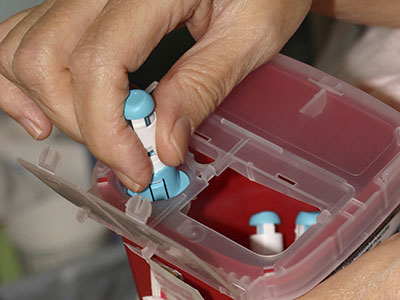
Covered by our Brooklyn Heights, Ohio Branch:
Request a FREE quote
Why Choose Us
-
Dedicated Customer Service
One of our experienced staff members is always available to answer questions or solve a problem.
-
No-Hassle
Call it in, fax it in or order online. Any way you choose, it will be simple and won't waste your valuable time.
-
Competitive Pricing
On average, customers are seeing a cost savings of 50% or greater.
-
Customized Plans
From medical, hazardous, pharmaceutical, and electronic regulated waste, BioServ can handle all your biomedical needs.
Understanding Kentucky's Medical Waste Regulations
The state of Kentucky does not have specific medical waste regulations or a single agency with jurisdiction over medical waste.
However, state regulations do reference how medical waste should be treated, handled, labeled, stored, transported and disposed of. Within Kentucky's Department for Environmental Protection, the Division of Waste Management provides requirements for the permitting and registration of waste facilities, transfer stations, and haulers, while the Division for Air Quality has set forth regulations for medical waste incinerators. Medical waste disposal regulations vary by facility type, per regulations from KY's Cabinet for Health & Family Services and Department for Public Health. Furthermore, regulations on several aspects of medical waste management come from the Kentucky Labor Cabinet (under the Kentucky Safety and Health Program); these include requirements for sharps, medical waste containers, labeling, and employee training.
Despite Kentucky's medical waste regulations coming from multiple agencies, BioServ has a strong knowledge of the requirements to keep your practice compliant.

Other KY Medical Waste Regulations
- Medical Waste Definition Kentucky defines medical waste as any waste that may be contaminated by blood, bodily fluids, or potentially infectious materials.
- Medical Waste Disposal In general, potentially infectious waste must be incinerated or rendered nonhazardous prior to disposal. At hospitals, pathological wastes must be incinerated, while blood, blood specimens, used blood tubes, and blood products can be incinerated, autoclaved, or carefully poured down a drain connected to a sanitary sewer.or locked area with restricted access, with refrigeration if necessary, and must be protected from animals and insects.
- Sharps Disposal Healthcare facilities are required to segregate sharps from other waste. Sharps containers must be incinerated on-or off-site, or rendered nonhazardous before disposal.







